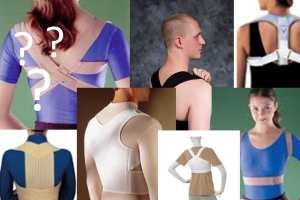 Many people spend hours each day sitting at a desk, which has led to large parts of the population developing bad posture and subsequent back and neck pain.
Many people spend hours each day sitting at a desk, which has led to large parts of the population developing bad posture and subsequent back and neck pain.
Poor posture is actually the most common cause of low back pain, and there’s no doubt that sitting for prolonged periods is a major contributor. However, unless you plan to quit your desk job in favor of more active employment, it’s probably up to you to consider ways in which you can improve your posture while working at a desk. There are a number of different posture aids on the market, some more effective than others.
Back braces – Although a back brace is intended to keep your spine straight, research suggests that in the majority of cases it ends up being worse for your back. A strong brace can be particularly bad. If your back muscles do not need to work in order to keep you upright, they will slowly atrophy and leave you with a weaker back than before, making it subject to increased risk of pain and injury. The weaker back braces become ineffective within 10-15 minutes of putting them on, as your body adapts to the brace and returns to its slumped position. Support braces for the lower back can be useful if worn for only short periods of time while you are recovering from a low back injury. These should be used in combination with exercises to strengthen the muscles of the lower back.
Ball chair – Whether you use a specially-designed “ball chair” or a standard exercise ball, the idea is that sitting on a ball will give the muscles that support your back more of a workout. Stronger back muscles mean better posture. However, a study performed by Canadian researchers at the University of Waterloo found that “prolonged sitting on a dynamic, unstable seat surface does not significantly affect the magnitudes of muscle activation, spine posture, spine loads or overall spine stability.” In fact, the study subjects reported increased discomfort while sitting on the ball as opposed to a standard office chair. If you have a job where you sit for only short periods of time, using a ball chair may help improve your posture.
Kneeling chair – The “kneeling chair” consists of a seat fixed at a 30-degree angle, with a padded support for the knees and upper shins. Sitting at this angle does help to keep the back straight, and if measured to the proportions of the owner, can be used for short periods of time. However, it is not advised that you replace your normal office chair with one of these. It can be hard on the knees and shins with prolonged use and does not allow for movement of the legs as you sit. It can also reduce blood flow to the legs.
Experts stress that the best way to improve your posture is to perform regular exercises that strengthen your “core” muscles (muscles in the low back, hips and abdomen), which are the ones that are used to support your spine and keep you upright. This, combined with the use of an ergonomic office chair that has a back support and which can be adjusted to adapt to your leg and arm height is the best way of maintaining good posture, allowing you to remain free of neck and low back pain.














